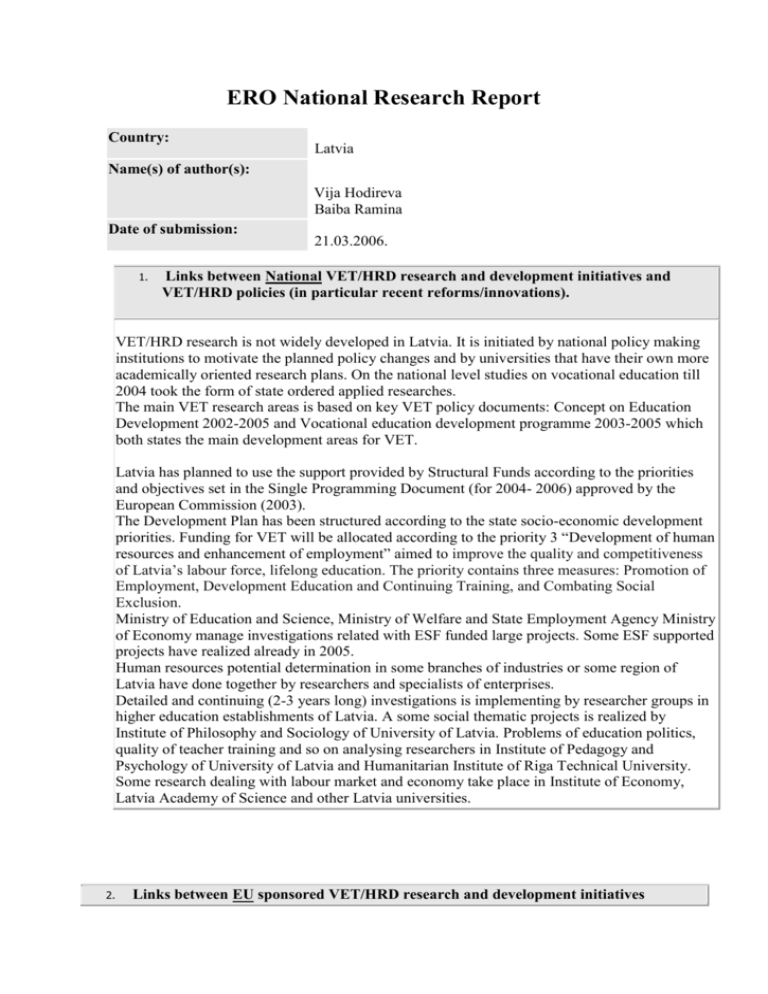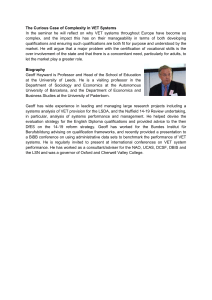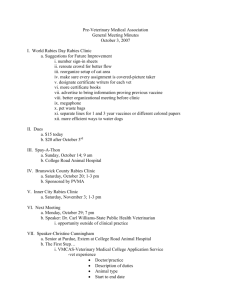Annex: Selection of ERO Base projects.
advertisement

ERO National Research Report Country: Latvia Name(s) of author(s): Vija Hodireva Baiba Ramina Date of submission: 1. 21.03.2006. Links between National VET/HRD research and development initiatives and VET/HRD policies (in particular recent reforms/innovations). VET/HRD research is not widely developed in Latvia. It is initiated by national policy making institutions to motivate the planned policy changes and by universities that have their own more academically oriented research plans. On the national level studies on vocational education till 2004 took the form of state ordered applied researches. The main VET research areas is based on key VET policy documents: Concept on Education Development 2002-2005 and Vocational education development programme 2003-2005 which both states the main development areas for VET. Latvia has planned to use the support provided by Structural Funds according to the priorities and objectives set in the Single Programming Document (for 2004- 2006) approved by the European Commission (2003). The Development Plan has been structured according to the state socio-economic development priorities. Funding for VET will be allocated according to the priority 3 “Development of human resources and enhancement of employment” aimed to improve the quality and competitiveness of Latvia’s labour force, lifelong education. The priority contains three measures: Promotion of Employment, Development Education and Continuing Training, and Combating Social Exclusion. Ministry of Education and Science, Ministry of Welfare and State Employment Agency Ministry of Economy manage investigations related with ESF funded large projects. Some ESF supported projects have realized already in 2005. Human resources potential determination in some branches of industries or some region of Latvia have done together by researchers and specialists of enterprises. Detailed and continuing (2-3 years long) investigations is implementing by researcher groups in higher education establishments of Latvia. A some social thematic projects is realized by Institute of Philosophy and Sociology of University of Latvia. Problems of education politics, quality of teacher training and so on analysing researchers in Institute of Pedagogy and Psychology of University of Latvia and Humanitarian Institute of Riga Technical University. Some research dealing with labour market and economy take place in Institute of Economy, Latvia Academy of Science and other Latvia universities. 2. Links between EU sponsored VET/HRD research and development initiatives and VET/HRD Policies ( in particular recent reforms/innovations). Until 2004 VET/HRD research were run by ETF through Latvia National Observatory now incorporated in Academic Information Centre. “Country Monograph: Vocational education and training and employment services in Latvia” (2004) - the research was prepared by ETF with significant contribution by national experts. The country monograph provides baseline information and analysis aiming to assess the progress made in implementing the priorities identified in the Joint Assessment Paper on Employment Policy (JAP) agreed between the Government of the Republic of Latvia and the European Commission on February 6, 2003. Current EU policies based on the Lisbon conclusions, such as the lifelong learning initiative, and the European Employment Strategy set the framework for the analysis. Annual reports on reform changes in IVET and CVT, key indicators reports, other specific research on social partnership, skills survey, quality assurance etc. like in other ES candidate countries went on by ETF support and AIC contribution. Now AIC is directly involved in CEDEFOP and ReferNet activities and main part of VET-Bib, VET-Inst, ERO and other data bases, and some parts of detailed Thematic Overviews work out by own expert group. European programmes, like Leonardo da Vinci, Socrates and other have compile only a few research VET/HRD in Latvia. In 2004 Latvia received ESF funding for labour market and human resources development research, the implementation of the projects have started on 2005. Only 13 research themes have been completed until the end of 2005. Main part of ESF and ERAF projects started in 2005 and is still ongoing. 3. Overview of important issues and themes addressed in current VET/HRD Research and Development projects. As there is no VET research strategy in country, all topics related to Vocational education development programme 2003 -2005 are considered as important. In 2004 VET research covered only following topics: Quality development of VET teachers and Progress in VET development in line with economical changes in country. In 2005 situation is significantly changed and here are more completed investigations: 1) the group of research themes deal with HRD in mechanical engineering and metalworking industries of Latvia (4); 2) the group of research themes deal with HRD in some Latvia regions (2); 3) the group of research themes deal with social vulnerable group problems and recommendation work out (2). Main groups of continuing investigation projects (granting by Latvian Council of Science): social process and quality of education, education reforms in Europe (3) teacher professional competences, teacher training (1) labour market and economy development (2). Annex: Selection of ERO Base projects. 1. Development of lifelong learning strategy and implementation http://www.trainingvillage.gr/etv/projects_networks/ero/prj_view.asp?theID=939 2. Working out of unified methodology to increase quality of vocational education and to involve and educate social partners http://www.trainingvillage.gr/etv/projects_networks/ero/prj_view.asp?theID=968 3. EU Structural funds National programme project ‘’Ministry of Welfare studies’’ http://www.trainingvillage.gr/etv/projects_networks/ero/prj_view.asp?theID=969 4. Major institutions involved in VET/HRD R&D in your country. 1. Academic Information Centre - was involved in main Cedefop ReferNet activities: documentary and dissemination activities, collection and analysis activities and partly in research activities, http://www.aic.lv 2. Vocational Education Development Agency, Leonardo da Vinci programme - measures/ types of activities: international pilot projects; international exchange and in-service training projects; international research and analysis, http://www.piaa.gov.lv 3. Humanitarian Institute of Riga Technical University (Rīgas Tehniskās Universitātes Humanitārais institūts), http://www.bf.rtu.lv 4. Institute of Philosophy and Sociology, University of Latvia (Latvijas Universitātes Filozofijas un Socioloģijas institūts, LU FSI) - HRD and role of education in the development of Latvia society, http://www.lu.lv 5. Institute of Pedagogy and Psychology, University of Latvia (Latvijas Universitātes Pedagoģijas un psiholoģijas institūts, LU PPI) - HRD, http://www.lu.lv 6. Institute of Economy, Latvia Academy of Science (LZA Ekonomikas institūts) development of a model for national economy, strategy of the national and local government budgets, development of the national social and demographic policy, conducting of sociological studies, http://www.lza.lv 7. Association of Mechanical Engineering and Metalworking Industries of Latvia (Nevalstiska organizācija Latvijas Mašīnbūves un Metālapstrādes Rūpniecības Uzņēmēju asociācija) protection of the entrepreneur interests in the sector in front of the state of Latvia and nongovernmental institutions as well as international organizations; contribution to the improvement in the educational system and vocational training of the sector’s specialists, promotion of the sector products and technological facilities including entrepreneurs’ involvement in the international fairs, exhibitions and consulting of the potential business partners, http://www.masoc.lv 8. Latvian electric engineering and electronics industry association (Nevalstiska organizācija Latvijas Elektrotehnikas un elektronikas rūpniecības asociācija) - unites companies, research and educational institutions registered and operating in Latvia, whose activities are related to Industry of Electronics and Electrical Engineering, Information and Communications Technology; wish to facilitate the development of education and science, the foundation of new enterprises, the economical and technical development of existent enterprises, to create favourable environment for innovations, http://www.letera.lv 9. Ltd „Baltkonsults” (SIA „Baltkonsults”) - financial and economic consulting 10. Ltd ‘’ERK” (SIA ‘’ERK”) - financial and economic consulting 11. Ltd ‘’ORAM” (SIA ‘’ORAM”) - financial and economic consulting 12. Ltd ‘’AI sistēmas’’ (SIA ‘’AI sistēmas’’) - financial and economic consulting 13. Institute of Social Alternative (Nodibinājums ‘’Sociālās alternatīvas institūts’’) – sociological research 14. Ministry of Welfare http://www.lm.gov.lv 15. State Employment Agency (SEA), http://www.nva.lv 16. Ministry of Economy http://www.em.gov.lv 17. Ministry of Education and Science http://www.izm.gov.lv 5. Funding frameworks and support structures. The main source of funding of VET research was Ministry of Education and Science. In 2004 the Ministry financed only one VET research “Assessment of upgrading facilities of VET teachers professional and pedagogical competences”. Till 2004 significant support to VET analysis and research was given by European Training Foundation. Ministry of Welfare is funding research on labour market training and unemployed training. Ministry of Economy is organising annual research on development of national economy. In 2004 Latvia received ESF funding for labour market, HRD, and VET research and the tendering and implementation of the projects have started on 2005. Research granting by Latvian Council of Science are financed from state budget. 6. Professional research associations and networks. There is no association or network uniting VET/HRD institutions. 7. Brief review/assessment of the current R&D activities and indication of future issues that need to be addressed. This section should be completed by a research expert. 7.1 Firstly, comment briefly on the status, effectiveness and impact of current VET/HRD R&D activities in your country. (One third of a page) VET research institutions in Latvia did not exist before 1990, during 90-ties and the same situation is also today . Research on VET was fragmented and had low impact to VET policy. Regular research on VET/HRD in Latvia started in 1996 and was initiated by ETF. The main research activities concentrated on issues that are relevant to priorities set by VET development programme and EU strategic documents. Since 2003 the number of VET/HRD research activities decreased due to limited funding, because till 2003 the VET research activities was significantly supported by ETF. The total expenditures for research and development in Latvia is 0.47% of GDP in 2000, 0.41% in 2001, 0,42% in 2002 and 0,38% in 2003 and it is very low in comparison with EU average. The main state funding for fundamental and applied research is devoted to IT, organic synthesis and biomedicine, science of materials, forestry science and wood technologies, letonica (Latvian language and culture). 7.2 Secondly, briefly outline and comment on those issues that need to be addressed by R&D in the future. (One third of a page) The main funding for VET related research in the next years is starting to come from ESF. The ESF projects’ activities are based on priorities stated in Single Programming Document. Single Programming Document stated that considering the current situation in the labour market, in the period of 2004-2006 one of priorities should be given to research and analysis of labour market situation and obstacles for entering labour market. Since 2005 the labour market research is started and some research is already finalized. Besides already mentioned activities the coordination of VET related research is issue which need to be discussed and solved in country. Also the research activities directed to VET accessibility, quality, effectiveness and life long learning aspect should be developed. We have at least five universities providing teacher education as well Humanitarian institute in Riga technical university, Education research institute, which is part of Faculty of Pedagogy and psychology in University of Latvia, Institute of Philosophy and Sociology in the University of Latvia. The VET research capacity in pedagogical universities should be highlighted and disseminate more efficiency. 8. VET/HRD contact people. Full name E-mail address Function Particular expertise related to VET/HRD research Inese Cvetkova i.cvetkova@latnet.lv Jolanta Gūža jolanta.guza@baltkons Project manager, ults.lv „Baltkonsults” Vija Hodireva vija@aic.lv Expert of Academic Information VET Centre, the Refernet National coordinator Aigars Laizāns letera@latnet.lv Project manager, Ltd ‘’ORAM” Human and development, Latvian electric engineering and population electronics industry association Anita Lanka anita@bf.rtu.lv Director of Humanitarian institute VET teachers training and of Riga Technical University further training Laima Levanoviča info@erk.lv Acting director of Latvian Social partnership, electric engineering and Information Technologies electronics industry association Ltd Human resource development resource society, Human resource development, society, Project manager, Ltd ‘’ERK” population, Aleksejs Milovskis rms@rms.lv Teacher, Riga Managers School Maruta Pranka sainst@inbox.lv Project manager, Institute Social Alternative Baiba Ramina baiba@aic.lv Director of Academic Human resource Information centre - Latvian development, VET systems, National Observatory general and higher education Solvita Silina solvita@aic.lv Expert of Academic Information Certification, Qualifications, Centre recognition of professional qualifications, labour market research Ilze Trapenciere ilze.trapenciere@sociol Expert of Latvian Free Trade Society, population, policy, ogy.lv Union labour market 9. References to VET/HRD research resources. Human resource development of Human development, population, resource society, Publications: Human resources potential determination in mechanical engineering and metalworking industries of Latvia and strategy creation to involve new specialists using advertising and motivation in the industry. Riga, 2005: First final report ‘’Analysis of human recourses in mechanical engineering and metalworking industries of Latvia’’ Second final report ‘’Communication strategy of mechanical engineering and metalworking industries of Latvia’’ Third final report ‘’Recommendations for decision makers and social partners to improve economic development strategy and cooperation in mechanical engineering and metalworking industries of Latvia’’ Web-based resources: Academic Information Centre http://www.aic.lv ESF in Latvia http://www.esfondi.lv Ministry of Education and Science http://www.izm.gov.lv Ministry of Economic Ministry of Welfare http://www.em.gov.lv http://www.lm.gov.lv Latvian Council of Science University of Latvia http://www.lzp.lv http://www.lu.lv Riga Technical University http://www.rtu.lv 10. Abstract. VET research institutions in Latvia did not exist before 1990, during 90-ties and the same situation is also today . Research on VET was fragmented and had low impact to VET policy. Regular research on VET/HRD in Latvia started in 1996 and was initiated by ETF. The main research activities concentrated on issues that are relevant to priorities set by VET development programme and EU strategic documents. Since 2003 the number of VET/HRD research activities decreased due to limited funding, because till 2003 the VET research activities was significantly supported by ETF. The development of VET system in Latvia is stated in the Concept on Education Development 2002-2005 and Vocational education development programme 2003-2005. In 2004 VET research was oriented to VET teachers quality development and progress in VET development in line with economical changes in country. In 2004 Latvia received ESF funding for labour market research, the implementation of the projects have started in 2005. The main funding for VET related research in the next years is starting to come from ESF. The ESF projects’ activities are based on priorities stated in Single Programming Document. Single Programming Document stated that considering the current situation in the labour market, in the period of 2004-2006 one of priorities should be given to research and analysis of labour market situation and obstacles for entering labour market. Since 2005 the labour market research is started and some research is already finalized.






